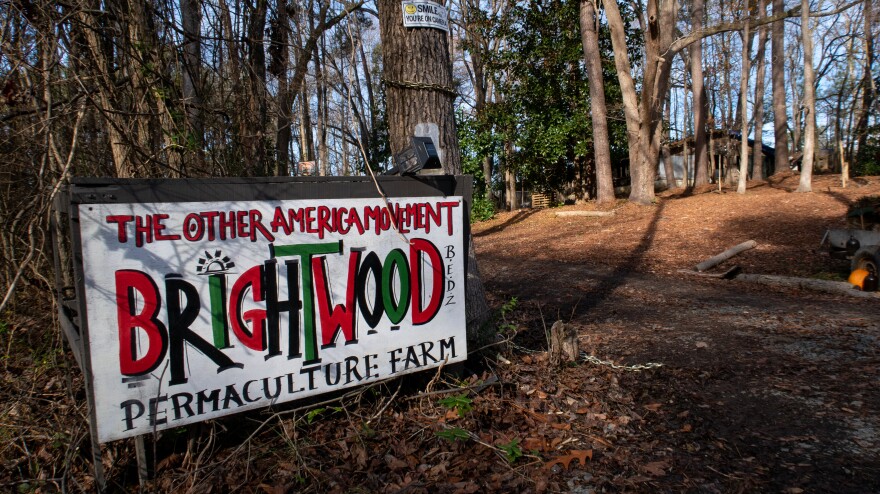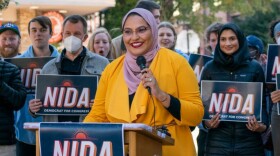On a crisp fall morning, Skip Gibbs of the group Other America Movement is alone, listening to Thelonious Monk, and tending to the garden.
"In these little mini greenhouses, we've started all of the winter crops like collard greens, broccoli, squash, pumpkins, beans, lettuce, turnips," said Gibbs, describing Brightwood, a permanent settlement of Black farmers and entrepreneurs he's working to build.
A gravel pathway runs from the garden through rows of tall pine trees and string lights, then up a gently sloping hill to the center of Brightwood. On one side where the path widens, there's a big, old barn under renovation. On the other, there's a line of yurts and a fire pit.
What we're doing out here in Brightwood isn't really a new concept. I think we're just brave enough to actually do it. -Skip Gibbs
Gibbs is trying to build what he calls a Black Economic Development Zone, a four-acre space in rural Durham County with eventually enough room for about 100 Black people to live and work. There are plans for a community garden, a livestock pen, an amphitheatre, a market and a library. Gibbs is establishing Brightwood in the image of historic Black communities like Greenwood in Tulsa, Oklahoma, or Black Wall Street in Durham.
"You didn't see those until the late 1800s, early 1900s because we stopped being afraid," he said. "And we understood the importance of autonomy and being self sufficient. So what we're doing out here in Brightwood isn't really a new concept. I think we're just brave enough to actually do it."
In June, a group of protesters pitched tents and set up camp in front of police headquarters in downtown Durham for more than a month. It was among the many demonstrations across the state demanding police reform after George Floyd was killed in Minneapolis.
The silence of Brightwood is a long way from the chanting of those demonstrations in downtown Durham this summer. But Gibbs welcomes that distance now.
"Sometimes I look back at those protests that I led, and I feel embarrassed," he said.
Gibbs and fellow protesters wanted the city council to redirect some of the police department's budget to social services, an action they believed could help ease racial disparities in education, health care, and economic opportunity.
But Gibbs says his mind changed during one of those protests. It happened while he was addressing about 200 people from the top of a pedestal where the statue of a Confederate soldier once stood in downtown Durham. The vast majority of people there were white.
"It was a way for these people to prove that they weren't racist," he said. "It was a way for them to take some pictures and throw it on their social media and go, 'Hey, Black people that I work with, I'm cool with you guys. Don't hate me. Don't be angry with me because I'm down with the brown.' And the few Black people that were in the crowd, I can't honestly say that a lot of my message resonated with them because they were on their phone, you know, taking selfies and doing all that same stuff, too. It made me feel like a puppet."
Gibbs remembers what he said as he was having that realization.
"I literally just started saying, 'Hey, man, we don't need to burn down the plantation, we need to buy the plantation'," he recalled. "If we're all out here living harmonious communal lifestyles, a mutualist lifestyle where everyone is truly important, then in essence we'll defund the police because we don't need them."

A Durham couple heard Gibbs' ideas. And this summer, they donated the land for Brightwood. But shortly after Gibbs and a group of volunteers first arrived to start clearing the forest, a neighbor accused them of trespassing and called the police.
Gibbs said the intimidation continued for weeks. Someone spread hundreds of nails on the side of the road near Brightwood.
"They call the city, they call the sheriff, they ride by and they throw things and they yell obscenities… even down to driving their trucks by really, really slow and not speaking to us," he said. "The idea of what we're doing here in Brightwood terrifies the 70-something year old people that live in this area, the 70-year-old white people that live in this area. Not because of Black people, but because of change in general."
While the Census Bureau says this part of Durham County is predominantly Black, Brightwood's immediate neighbors are white.
Brightwood Farmers' Market
About 100 people came to Brightwood's first farmers' market this fall with a dozen local business owners. Roy and Christopher Graham are brothers who own a cookie company called Bite.
"Bite stands for Bruh, I'm Tryna Eat," Roy Graham said.
"And our goal is to sell a million cookies," added Christopher Graham.
A handful of vendors - including the self-proclaimed "Graham Squad" - started their businesses during the COVID-19 pandemic. From behind a face covering, Roy Graham said the outbreak was the nudge they needed to turn a dream into dough.
"COVID just kind of sat us down and made us want to work on things," Roy Graham said. "We always knew we wanted to do a family business, to have something to pass on to our children."
As for Brightwood, the Grahams say they love it.
"I love what it stands for. It's actually some of the things we've talked about; group economics," Roy Graham said.
"Having your own and fending for yourself," Christopher Graham said.
"It's all about positivity and spreading the love," Roy added.
Other business owners and their customers echo that feeling of camaraderie here. Brightwood architect Skip Gibbs looks across the market toward his mother, Rosa Underwood. She describes Brightwood as a place of Black fellowship in a time when the country is reckoning with racial inequities.
"The stress of being Black... I mean, if I had 100 days, I probably couldn't tell you it all," Underwood said. "It's a hard thing... But coming out here, even just for an hour, I feel so much better. I'm very proud of what my son is trying to achieve here. But I also know that there are people out here who don't want him to achieve it."
Gibbs has been successful in getting people to visit and support Brightwood. The challenge, he says, is getting them to stay and help build it.
"To be honest with you, it's not where I wanted to be," he said. "I want it to be more of an actual community. I want it to inspire and I want it to provoke thought in more people who look like me. We have a lot of white people that come out and volunteer… way more than we have Black people. And in that sense, I'm not happy."
Brightwood's construction is actually ahead of schedule. It has power and potable water, but it lacks other amenities people are used to in modern communities like central heating and air or an Internet connection.
"Choosing to live this lifestyle doesn't mean that you have to go without the amenities that society has to offer," Gibbs said. "It means that you have to build enough infrastructure and enough community to later on, implement those amenities on your own terms for the benefit of your own people."
For Brightwood to work the way he envisions, Gibbs says he needs more people to buy in now, not when the infrastructure is done. He invokes the words of rapper Mike Jones to make his point.
"'Back then they didn't want me. Now I'm hot. They all on me.' It's not one of those things. I need people to be involved from the jump, from its inception," he said. "And those are the people who can live out here."
Right now, Gibbs is the only one who regularly stays in Brightwood. But he intends to keep cultivating the winter crops and waiting for his community to grow.









